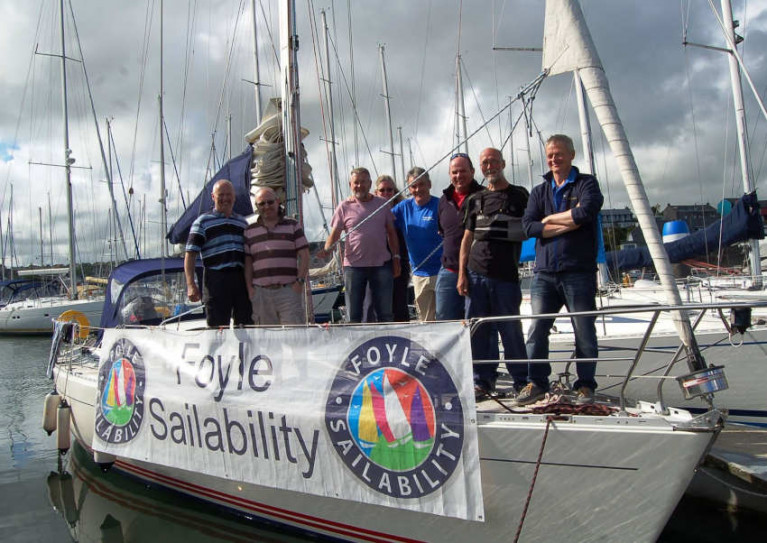Displaying items by tag: Foyle Sailability
Foyle Sailability has been confirmed to return as a water-based activity provider for this year’s Foyle Maritime Festival.
This is the third year Foyle Sailability has been involved in the maritime festival, with bookings now available for sailing sessions along the River Foyle on Wednesday 20 July and Sunday 24 July from 10am-3pm.
Foyle Sailability is a cross-border voluntary organisation provides opportunities for sailing and other water sports to people with disabilities, with the help of specialised equipment and boats and guidance from qualified volunteers.
The organisation’s secretary Ken Curry commented: “We’re delighted to be part of the Foyle Maritime Festival once again and hope many people will join us for some fun and informative sailing sessions.
 Bookings are now available for sailing sessions along the River Foyle on Wednesday 20 July and Sunday 24 July from 10am-3pm | Credit: Foyle Sailability
Bookings are now available for sailing sessions along the River Foyle on Wednesday 20 July and Sunday 24 July from 10am-3pm | Credit: Foyle Sailability
“We welcome participation from anyone with a disability or those who face severe disadvantages — whether you have any on-the-water experience or not.
“In the short term, we are giving people with disabilities the chance to take to the water themselves, with expert help. In the longer term, we want to offer the kind of support which enables those of us with disabilities to aspire towards the highest levels of sailing or water sport skills.”
Limited spaces are available for the water activities at the Foyle Maritime Festival. Bookings can be made via Eventbrite.
The Foyle Maritime Festival returns this summer for the first time since 2018, alongside the Clipper Round the World Yacht Race fleet. The five-day event runs from 20-24 July, with thousands of people from all over the world expected to attend. The festival is supported by the Loughs Agency in partnership with Derry City and Strabane District Council, Visit Derry and Tourism NI.
RYANI Recognises Foyle Sailability For Keeping Members Connected and in Good Spirits During Lockdown
RYA Northern Ireland’s Annual Awards have been put on hold this year due to coronavirus restrictions but this doesn’t mean that the celebrations have stopped.
Virtually, RYANI will be celebrating clubs and the boating community right across Northern Ireland as part of its Recognition 2020 initiative, sharing amazing success stories from a very challenging year.
Speaking about the initiative, RYANI’s chief operating officer Richard Honeyford said: “We all know 2020 has been a tough year, especially for those who have lost loved ones or been otherwise impacted by the pandemic.
“The boating community has shown itself to play such an important part within local communities and we want to capture that effort and achievements in what has been extremely difficult circumstances.
“Whether it is an individual achieving something significant or a club supporting the NHS and key workers, we would like to hear from you.”
The first inspirational club in the Recognition 2020 series is Foyle Sailability. The club is vitally important for its members, providing them with a chance to sail and also the opportunity to engage with others.
When restrictions were announced, Foyle Sailability very quickly replaced regular events with online meetings. A lighthearted catch-up with some training and discussion around important issues facing the club, this gave members something to look forward to each week.
The weekly catch-up was such a hit with members that it has become a much-loved weekly event — and the WhatsApp group after the meeting is usually a hive of activity, keeping everyone connected and in good spirits.
Fundraising has been particularly difficult this year but the club has used online Zoom meetings to publicise its work. Recently an online meeting was set up with the club’s local Inner Wheel Group where members heard about Foyle Sailability’s important work.
They also had the chance to hear first-hand from chairman Garry Crothers about his journey sailing across the Atlantic single-handed. Garry, who lost an arm in a motorcycle accident in 2009, told an inspirational account of his trans Atlantic crossing.
Since the meeting, the Inner Wheel Group has announced it will adopt Foyle Sailability as its chosen charity this year. Other groups have also been in touch to find out what can be arranged via online meetings.
Foyle Sailability is a shining example of a club that has been adapting positively to the Covid restrictions. From innovative funding link ups to keeping members socially connected, Foyle Sailability is leading the way.
The club has always been forward-thinking, right back from its inception. The club started absolutely no equipment about eight years ago and they now have 4 Hansa 303s, a Hawk 20 and two safety boats.
Ken Curry from the club explains: “Initially members came for a sailing session with their local groups, and they may have seen them only once or twice. We then ran an inter college regatta for disabled students. We took the dinghies to the colleges and then ran on the water training sessions.
“The students loved it and we realised we needed to do more, so we set up evening sessions every two weeks due to tidal restrictions. Most of these students returned every time and are still regular participants.”
Commenting on pandemic restrictions, Ken explains: “When the Covid-19 restrictions came in, we all knew that there would be little or, as it turned out, no sailing this year. Our disabled members were so disappointed.
“Not only do they love sailing, but they love meeting up with their friends. They were going to miss the social side as much as the activities. Luckily we had a WhatsApp group to keep in contact.
“I decided to try Zoom for the first time so that we could all meet, see each other, chat, have some fun and also do training. It was such a success that the free Zoom 40 minute session wasn't long enough. So now with a full zoom membership, every Monday evening we carry out training and have loads of fun, too, with no time restrictions.
“Hopefully we can get back on the water early next year, but in the meantime, we continue to learn using the RYA Sailability Logbook as a guide and to enjoy each others’ company.”
First Foyle Regatta For Sailors With Disabilities
#Regatta - The recently established Foyle Sailability will host its first regatta for people with disabilities in Derry this Thursday and Friday 16-17 May, as the Derry Journal reports.
Volunteers from Lough Foyle Yacht Club, Lough Swilly Yacht Club and Moville Boat Club will be on hand, joined by volunteers from Belfast Lough Sailability for the two-day event which marks the first time that a fleet of accessible dinghies has cruised together on the River Foyle.
People with disabilities across the northwest are invited to try out sailing for themselves by contacting Foyle Sailability at 71 266 593 or [email protected].
The regatta will meet at the Foyle Pontoon at Riverfront Walkway off Baronet Street from 11am to 3pm each day of the event.

























































